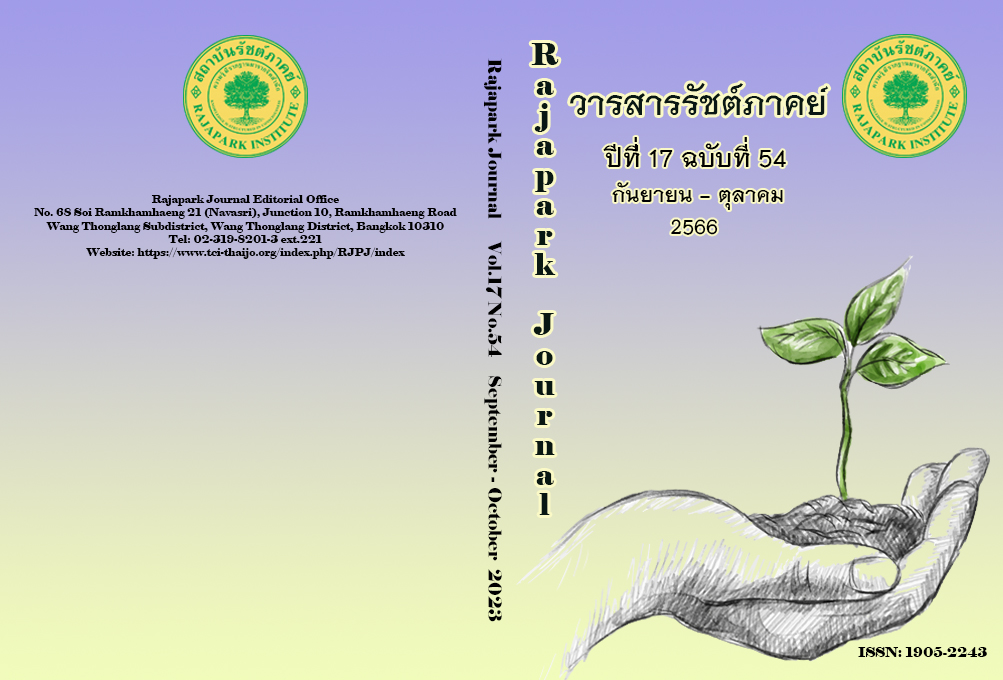A Creative Leadership Development Model for School Administrators in the Northeast Under Office of the Basic Education Commission
Main Article Content
Abstract
The objectives of this research were: 1) to study the components of creative leadership among school administrators in the Northeastern region under the Office of the Basic Education Commission; 2) to create a creative leadership development model for school administrators in the Northeastern region; and 3) to evaluate the creative leadership development model of school administrators in the Northeastern region under the Office of the Basic Education Commission.
The research method consisted of three steps: 1) Study of the components of creative leadership among school administrators in the Northeast; data was analyzed by Confirmatory Factor Analysis (CFA). 2) Create a creative leadership development model for school administrators in the northeastern region through seminars based on experts (Connoisseurship) of nine people using content analysis, and 3) evaluate the creative leadership development model for school administrators in the Northeast, by five experts who were obtained by purposive sampling. The statistics used in the research were the mean and standard deviation. The results showed that 1) the components of creative leadership consisted of 11 components. 2) The creative leadership development model of school administrators in the northeastern region consisted of three parts: The leading part consisted of the principles, objectives, and goals of the creative leadership development model, component-based creative leadership development processes, and evaluation guidelines. The implementation part contains success conditions, and 3) the results of using the model and the overall usefulness in all aspects were at the highest level.
Article Details

This work is licensed under a Creative Commons Attribution-NonCommercial-NoDerivatives 4.0 International License.
Views and opinions appearing in the Journal it is the responsibility of the author of the article, and does not constitute the view and responsibility of the editorial team.
References
Annunzio, S. (2010). Evolutionary Leadership: Dynamic Ways to Make Your Corporate Culture Fast and Flexible. Simon and Schuster.
Ash, R., & Persall, M. (2007). The Principal as Chief Learning Officer, the New Work of Formative Leadership. Stamford University Birmingham.
Charoenwongsak, K. (2007). Super Leadership. Success Media.
Hair, J.F., Black, W.C., Babin, B.J., & Anderson, R.E. (2010). Multivariate Data Analysis (7th ed.). Pearson.
Keawsuphan, S., Sripathar, S., Sathitanant, S., & Singhalert, R. (2009). An Effective Administration Model for Educational Quality Assurance in Basic Education Schools. Rajabhat Maha Sarakham University Journal, 3(3), 25-34. https://so05.tci-thaijo.org/index.php/rmuj/article/view/29952
Kelly, J. (1998). Organizational Behavior. Richard D. Irwin.
Koontz, H., O’Donnell, C., & Weihrich, H. (1994). Management. Prentice Hall.
Information Group Bureau of Basic Education Policy and Planning. (2020). Statistics for the year 2020. https://www.bopp-obec.info/home/?page_id=33748(opens%20in%20a%20new%20tab.
Joksathit, S. (2007). The Participation in School Administration of Teacher in Bangkok Metropolitan Administration[Master’s thesis, Phranakhon Rajabhat University].
Larsson. M. (2007). Creativity Leaders: Success Factors in Sweden's Leading Creative Agencies[Master’s thesis, Royal Institute of Technology, Sweden].
Ministry of Education. (2007). Management (Leadership) Organization for Change. http://www.moe.go.th.
Mongkolvanich, C. (2011). Organizational Management and Educational Personnel. Siam Institute of Technology.
Nuchaitong, B. (2018). The Relationship Between Creative Leadership of School Administrators and the Effectiveness of Schools Under Suratthani Primary Educational Service Area Office 1[Master’s thesis, Surstthani Rajabhat University].
Office of the Secretary of the National Strategy Committee. (2018). National Strategy 2018 – 2037 (Published in the Government Gazette). Office of the Development Committee National Economic and Social Administration.
Phusara, K. (2019). The Relationship Between Creative Leadership of School Administrators and Effectiveness of Schools Under the Supervision of Phranakhon Si Ayutthaya Primary Education Service Area Office 1[Master’s thesis, Phranakhon Si Ayutthaya Rajabhat University].
Pincharoen, V. (2007). Administration of Basic Educational Institutions. According to the Project of One District, One School in the Dream, Suphanburi Educational Service Area Office[Master’s thesis, Suan Sunandha Rajabhat University].
Punriboon, B., Kampirapakorn, P., & Karahan, W. (2021). The School Administrators’ Creative Leadership Factors Affecting the Effectiveness of School Management: The Study of Schools Under the Office of Secondary Educational Service Area 21. Journal of Educational Administration and Leadership, 9(35), 57-67. ttps://jeal.snru.ac.th/ArticleView?ArticleID=924
Ritbumrung, S., & Ariratana, W. (2014). Creative Leadership of School Administrators Affecting Effectiveness of School Under the Secondary Educational Service Area Office 30. Journal of Education Graduate Studies Research, 8(2), 190-198. https://so02.tci-thaijo.org
/index.php/EDGKKUJ/article/view/50975
Sangnimnuan, S. (2009). Leadership and Good Governance in the Administration of Local Government Organizations. S. Charoen Printing.
Sararattana, W. (2012). Concepts, Theories and Issues for Educational Administration (8th ed.). Tippayawisut.
Songpratum, W. (2000). Creative Leadership. Journal of Development Administration, 40, 79-82.
Sriphuthorn, P. (2019). A Study on the Creative Leadership of the School Administrators in Schools Under Rayong Primary Educational Service Area Office[Master’s thesis, Rambhai Barni Rajabhat University].
Warutbangkool, W., & Teerakul, S. (2010). School Administration and Educational Supervision (2nd ed.). Khanith Printing.
Wongkruasorn, P. (2019). Development Model of Teacher Leadership on Instructional Management in Thailand 4.0 Era in Primary Schools Under the Regional Education Office No.11[Master’s thesis, Sakon Nakhon Rajabhat University].


